Peter MALONE
Saturday, 18 September 2021 19:58
Turbulence
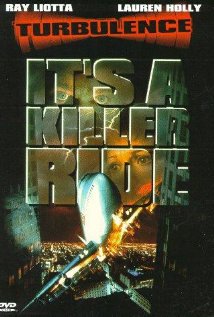
TURBULENCE
US, 1997, 100 minutes, Colour.
Ray Liotta, Lauren Holly, Brendan Gleeson, Hector Elizondo, Rachel Ticotin, Jeffrey De Munn, John Finn, Ben Cross, Catherine Hicks.
Directed by Robert Butler.
Strongly reminiscent of the series of twenty years ago this should have been called Airport 97. Having Lauren Holly bring down a passenger jet (as Karen Black did so long ago) as well as cope with Ray Liotta as an increasingly cuckoo killer on board provides some adrenalin rushes.
But they whole thing is pretty preposterous, although it does offer audiences plenty of excitement and some reassurance about computers and automatic pilots and how safe they can be. Literally, over the top.
1. The title, expectations? In the tradition of the older disaster movies of the 1970s? Airport and aircraft disasters? 1990s version?
2. The New York settings, the police, the streets, the raid on the house and the arrest? Airports, the LA control tower? The musical score?
3. The planes, interiors, the engineering, pilot and autopilot, the role of the crew, the flight attendants and their service? Computers and consultants? The holds?
4. The police group tracking Ryan Weaver? His walking along the street, buying the bear, the visit to the young woman, professing his love, she loving him, the sudden raid, his arrest? Aldo Hines and his pursuit of Weaver, planting evidence, kicking him when down, and the audience unsure about Weaver as guilty or not? The introduction to him with his charm, character, protests that he was innocent, Hines and his brutality, in prison, the transfer to Los Angeles?
5. Teri, at Christmas, the decorations, sad? The breakup? The film’s use of the Christmas atmosphere, the decorations in the city, on the planes, Christmas moods, few passengers travelling, screening It’s a Wonderful Life and using the song Buffalo Gals?
6. The flight attendants arriving, Teri, Maggie, men and women, jobs, the prisoners aboard, tossing the coin, Teri serving the prisoners, the drinks, the menu, the repartee with Weaver, the gross remarks of Stubbs?
7. The boarding, Stubbs, the background of his robberies, crass, the marshals accompanying him? Weaver and his marshals? The discussions, Stubbs wanting to go to the toilet, Weaver supporting him? Stubbs unscrewing the tap, the attack on the Marshall, getting his gun, the random shootings, the deaths of the marshals, the hole in the side of the plane, Teri trying to get the suitcase to block the whole, the captain emerging, his being shot?
8. Weaver, his flirting, Teri’s rebuffs? Weaver and his control, offering to help, moving the bodies, going to the cockpit, the associate pilot, wounded, and Weaver and his death? Moving all the passengers to the back and locking them in?
9. The range of passengers, the skateboarder wanting the beer? The elderly couple and fussing, the trauma for the passengers?
10. Teri, not knowing the details of flight, listening to the microphone, following the directions, able to make contact? The contact with Captain Samuel Bowen? His clarity in explaining in detail the movements, where the controls were? Her following everything? The personnel in Los Angeles, keeping personal contact, morale boosting? Sinclair and the FBI, having the fighter plane in readiness, his making the decision that the plane should be shot down, one or two deaths compared with thousands if the plane crashed into LA?
11. The police authorities, Hines going to LA, going to the airport, his advice to Teri? The contrast with Sinclair?
12. The ominous storms, the amount of turbulence, the plane rolling in a circle?
13. Weaver, his approach to Maggie, mutual dislike, telling the truth, yet his sexual approach and murdering her? His appeal to Teri that she come to help?
14. Teri, the seductive approach in order to hit weaver? The verbal games? Physical struggles? Her trapping him and the roof closing on his leg? In the hold, getting the axe, destroying the autopilot?
15. Weaver, becoming more and more insane? Wanting to die?
16. Teri, told to stay put, going out, her motivations, the clash with Weaver, eventually shooting him? Going back into the cockpit, the details from Captain Bowen, autopilot, the fighter plane beside her, Sinclair telling him to obey, the pilot waiting?
17. The plane out of control, crashing into the buildings, the hotel at Christmas, the car attached to the bottom and its dragging the plane down?
18. The finale, success? The final credits and the busy detail after the landing?
Published in Movie Reviews
Published in
Movie Reviews
Tagged under
Saturday, 18 September 2021 19:58
Fog over Frisco
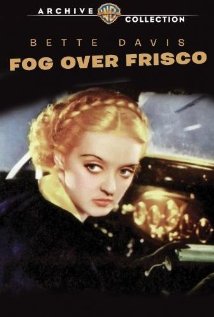
FOG OVER FRISCO
US, 1934, 68 minutes, Black and white.
Bette Davis, Donald Woods, Margaret Lindsay, Lyle Talbot, Hugh Herbert, Arthur Byron, Robert Barrat, Henry O ' Neill, Irving Pichel Douglass Dumbrille, Alan Hale, Gordon Westcott.
Directed by William Diertele.
Fog over Frisco is a very brief Warner Brothers crime melodrama of 1934, featuring Bette Davis who won the Oscar that year for Of Human Bondage. She is the villain in this film and disappears well before the end. She is the bad sister and Margaret Lindsay the good sister.
Bette Davis is involved in swindles, using a non-intended fiance to manipulate bonds, in cahoots with crime leaders. Donald Woods is a reporter, along with the photographer, played by Hugh Herbert, providing some moments of humour. However, the plot is quite complex, especially with Bette Davis’ doings and her murder. Robert Barrat is a sinister butler, not all that he seems to be.
1. Warner Brothers crime drama of the 1930s? Production values, black and white photography, San Francisco society, newspapers, police, crime investigation? Brief?
2. The family setting, the father and his relationship with his daughters? Arlene as the wicked daughter? Bette Davis’ character? In society, her fiance, the criminals, the connection with bonds, swindling? Her double-dealing? Her death? Disappearance from the film? Leaving the film to her good sister, Val, her relationship with Tony and his newspaper work? The touch of romance?
3. The household, the role of the father, towards his daughters? The butler? Sinister? The final revelation?
4. The police, the Inspector, the investigations, and covering the truth?
5. Tony, Izzy, the work at the office, investigations, clues, and covering the crime, photographs?
6. Complicated plot in a brief time – but entertaining?
Published in Movie Reviews
Published in
Movie Reviews
Tagged under
Saturday, 18 September 2021 19:58
Phoenix/ 2014
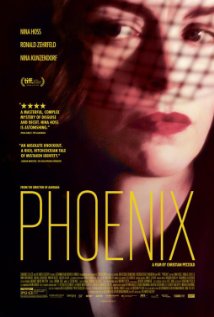
PHOENIX
Germany, 2014, 98 minutes, Colour.
Nina Hoss, Ronald Zehrfeld, Nina Kunzendorf.
Directed by Christian Petzold.
It is not often that a film review starts with a recommendation for audience to see it because of the final scene, but this is the case with Phoenix. This final scene is most effective: song, Speak Low, its melody has been heard throughout the film – a song by Kurt Weill and Ogden Nash for the musical, One Touch of Venus, a Pygmalion story of a statue coming to life – and now sung by Nelly, the central character, her husband Johnny playing the piano, and a glimpse of a tattoo which makes all the difference. It is an ending which does not spell out its consequences, leaving it for the audience to respond and to decide.
With a title like Phoenix, it would seem that this is a film about a character rising from ashes to a new life. And that is correct. It is the dramatic story of Nelly, a Jewish woman arrested in Berlin in 1944, interned in the camp at Auschwitz, thought to have died, but returning to Berlin at the end of the war.
Phoenix has been directed by Christian Petzold, director of a number of very successful German dramas, many of which starred Nina Hoss (Barbara, a story about East Germany, Yella, Jerichow). Nina Hoss one a Best Actress award at the Berlin film Festival, 2012, for Barbara and her performance as Nelly is as good and as powerful.
At the opening of the film, Nelly’s face is in bandages as she travels by train from Poland to Germany in the company of a friend, Lene (Nina Kunzendorf). She goes for an operation for facial reconstruction, wanting her old face as much as possible instead of a new one. But, her face is sufficiently different as she goes to seek out her husband who works in a Berlin club. He does not recognise her. This is very sad for her as she still loves him.
Her husband, Johnny (Ronald Zehrfeld) is a handsome type, with some charm. However, he decides to transform Nelly into his wife, overtones of Pygmalion. There are many scenes where Nelly has to write, walk, be transformed with clothes and make up into Johnny’s wife because he thinks she is dead, but if she is alive, she and he can claim her money.
The audience knows the truth while Johnny does not, so there is a tension in Nelly’s love, her following the directions that Johnny gives her, but her wanting to know whether he actually had betrayed her to the Nazis or not.
The film gradually builds its tension, the focus on Nelly and her anguish and love, the focus on Johnny and his ambitions, the sadness of Nelly’s friend Lene and her despair after the war, and the drama of Nelly’s train ride and alleged arrival from the East – and that final, powerful scene.
1. A satisfying drama? The background of World War II? Germany, the arrest of the Jews, interning the Jews in Auschwitz, the experience of the concentration camps, the release from the camps?
2. The title, Nelly and her rising from the dead? The name of the club?
3. The settings, Berlin, arrivals back from the camps, the homes and recovery? The streets, the thugs, the clubs, the entertainment? The bombed city? The cellar? The countryside? The mansion? Atmosphere and musical score?
4. A portrait of Nelly, the performance by Nina Hoss? Her screen presence? Gaunt, her experience in the camps? Lene and her accompanying, taking her home, helping her with her recovery? Confidante? The repercussions of the camp experience?
5. Nelly, the damage to her face? Going for the plastic surgery, the role of the doctor, his request about her new face, her wanting the old one, yet Johnny not recognising her? The experience of the surgery, her psychological state? Being sustained by her memories of Johnny and their marriage, their working together, the singing, his playing? The successful surgery, the bandages, her wanting to find Johnny?
6. Her going to the club, uncomfortable, the clientele, the two singers and singing Cole Porter, Night and Day? German? English? Her glimpsing Johnny, his work in the club? Lene warning her against the search?
7. Going to the club, calling out to Johnny, her being thrown out? His following her, seeing a resemblance? His proposition, his explaining about his dead wife, his wanting to get her money, his wanting to train her to be like his wife?
8. Memories of the Pygmalion story? Johnny, having Nelly in the cellar, testing her writing, signature, shopping list, her doing it perfectly? Changing her clothes, make up? Changing her walk? The effect on Nelly? Still loving Johnny?
9. Discussing with Lene, Lene’s objections? Going back to the house, the housekeeper, the letter, Lene killing herself? Her leaving the document about Johnny divorcing her?
10. The explanation of all the relatives, in the photo, Johnny explaining who each one was on, what they would do when she returned?
11. The visit to the country, memories of the past, the effect on Nelly, still trusting Johnny? Her going to the mansion and talking with the woman and getting the information about Johnny?
12. The preparation for her return, going to the country, in the train, the railway station, all the relatives meeting her, the story of those would died, the particular greetings of each one?
13. Johnny, audience response to his character, some charm, seeing his venal attitude towards her money, his makeover of Nelly? The revelation, the documents, the prospect of the money? The memories of Auschwitz – and his wanting her to put a tattoo on her arm? Her refusal?
14. The use of the melody of Speak Low throughout the film, from Kurt Weill and Ogden Nash – and the musical, One Touch of Venus (and a statue becoming human)?
15. The finale, the relatives all present, Nelly wanting to sing for them, Johnny playing the piano, the lyrics of Speak Low as they related to her experience, Johnny playing, she seeming tentative? Her changing, singing properly, Johnny stopping his playing, a realisation of the truth, the camera moving to the tattoo on her arm?
16. The power of the ending? What would happen? Nelly and the truth? The relatives? And the truth a bout Johnny and his divorcing her, the set up for her arrest?
Published in Movie Reviews
Published in
Movie Reviews
Tagged under
Saturday, 18 September 2021 19:58
Conspiracy Theory
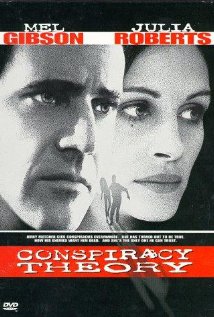
CONSPIRACY THEORY
US, 1997, 135 minutes, Colour.
Bill Gibson, Julia Roberts, Patrick Stewart, Alex Mc Arthur.
Directed by Richard Donner.
Mel Gibson joins with a favourite director, Richard Donner (Lethal Weapon series and Maverick) as a frantic cab-driver in New York City, a non-stop gabbler of crazy hypotheses. How he got that way is a conspiracy theory in itself. Behind it all is a sinister Patrick Stewart who runs a group of brainwashed assassins. Desperate Mel has a crush on lawyer Julia Roberts and eventually persuades her to help him - which doesn't make life any easier for her.
The screenplay was written by Brian Helgeland, who directed Mel Gibson in Payback. He also wrote LA Confidential and Mystic River and directed A Knight’s Tale as well as the story of the Kray Brothers, Legend.
It's a mixum gatherum of action, thriller and Mel Gibson's ironic and punning humour. The role is a challenge for him in interpreting such an offbeat character but his acting tends to set us on edge rather than entertain. Holes galore in the plot. Entertaining enough its way but soon forgotten.
1. 1990s thriller? Serious, conspiracies, mind games, authorities?
2. The city settings, the opening with the taxi rides, Jerry and his strange apartment, the articles and posters, photos? Offices, security, executives? Torture areas? Chases? Old warehouses, mental institutions? The change in going to the countryside, the horses? Atmosphere for a thriller? The use of the theme: You’re too good to be true?
3. The cast, Julia Roberts in the 90s, Mel Gibson the 90s, his work with director, Richard Donner, Patrick Stewart as villain?
4. The introduction to Jerry, his continued babbling, discussing the variety of theories, conspiracies, with his passengers, endangering them with his preoccupation and driving? The collage of his memories and his confusion?
5. Alice, the death of her father, the mystery not solved, her work in the office, her superiors? Jerry coming to see her, her hiding, then going out, talking frankly with him, the bonds between them? His continued patter, all his theories? His devotion to her?
6. Jerry picked up, the interrogation, the injections, with Dr Jonas, Jerry biting his nose? Escaping?
7. Jonas, coming to the office, the bandage on his nose, Alice being alerted? Going to Jerry’s home, his explanations, his magazine, circulation, limited readership?
8. The role of the police, the FBI, agent Lowry and the questions, in the car, trying to protect Alice?
9. Being taken by Jonas, his threats, his role, government, the training of assassins, chemical procedures, brainwishing?
10. The long close-up discussion between Alice and Jerry, his explanation of what happened to him, about her father, his not being responsible, his trying to protect Alice?
11. Jerry captured, interned in the abandoned building, Alice going to the institution, the voice contact with Jerry, going to rescue him, Agent Lowry and his intervention, Jerry and his struggle with Jonas, Jonas drowning?
12. Jerry, being shot? The effect on Alice? Her speaking with wounded Jerry? Going to the cemetery? Jerry, recovered, with Agent Lowry, going to the cemetery, the reconciliation with Alice?
Published in Movie Reviews
Published in
Movie Reviews
Tagged under
Saturday, 18 September 2021 19:58
Behind Enemy Lines

BEHIND ENEMY LINES
US, 2001, 106 minutes, Colour.
Owen Wilson, Gene Hackman, Gabriel Macht, David Keith, Olek Krupa, Joaquim de Lameida.
Directed by John Moore.
The setting is Bosnia, 1995, and once again civil war in the Balkans. And again, there is an American presence as part of a United Nations peacekeeping force. When a crack aerial photographer and his pilot are shot down while photographing the mass burials at Srebrenica and the pilot killed, the lone aviator tries to make his way back to a rendezvous to be rescued.
This is familiar material from war movies. The Americans are always at great pains to rescue any of their men, making it a priority. Reviewers critical of pro-US morale-boosting movies are prone to condemn this kind of patriotism, pointing out that Americans should think of the wider and greater good. While they might have a strategic point - illustrated here by the refusal of a NATO admiral to authorise a rescue operation - it seems something of a petty criticism as if other nations, no matter what their politics or religion, would not act in a similar way.
The aviator played, surprisingly, by comedian and writer, Owen Wilson (Rushmore, Shanghai Noon, Zoolander, The Royal Tennenbaums), has some extraordinarily heroic feats to endure in the film, including hiding amongst the corpses in the mass grave, running something of a hurdling marathon over live wires and mines in an industrial compound and warding off relentless guerillas in the Balkan snows. Which makes for exciting viewing, especially since Irish director, John Moore, draws on his skills in advertising and an array of special effects that make some of the action, especially the hitting of the plane and the ejection, quite spectacular.
Of course, there is the point that the American admiral decides to sacrifice his career in order to complete the rescue of one of his men despite the NATO veto. As played by Gene Hackman (in a role similar to that in Crimson Tide), his is the voice of human heroic reason.
1. Patriotic American War film? Pro- American forces? The American military tradition? Involvement in Europe? As perceived by Europeans?
2. The 1990s, the wars in the Balkans, savagery, nation against nation from the united Yugoslavia, the uprisings, the role of Muslims, rebels, savage battles, massacres, ethnic cleansing? A film of 2001, close to the events? In further retrospect?
3. The title, straightforward, the particular enemies in this story? In relationship to the Balkan wars? To the Americans?
4. Chris Burnett’s story, Owen Wilson in a serious role? Action role? His background, the phone calls to his father, seven years in the military, wanting to get out? His personality, the touch of the reckless? With Stackhouse? The friendship? Work together, pilot and navigator? The opening, flying, technical detail, the landing, the football and the bet about its return? With the other men? Joking, talking personally? His being summoned to the Admiral? His apology about the football, the Admiral wanting to test his motivations, the letter of resignation? Two more weeks?
5. The NATO situation, the Admiral, the meeting with Admiral Piquet, peace treaties, the endangerment to the treaty, the complexities, the overall point of view? The two admirals and their authority?
6. Chris and Stackhouse, joyriding, the camera, flying over enemy territory, the response of the enemy, firing the rockets, the sequence showing the attack of the rocket, their eventually being hit, injecting, landing, the archangel on the cliff top, the bedding of the camera? Stackhouse and his being injured, Chris going to survey, the rebels coming, the interrogation, the military dress, the pursuer in ordinary clothes, shooting Stackhouse, Chris’s cry, their being alert to him?
7. The chase, Chris evading his pursuers, running through the forests, the mountains? His radio contact, not using names, the Admiral and his concern, exasperation? Arranging the helicopter pickup? Admiral Piquet and his forbidding it? Further contacts, different rendezvous points?
8. The picture of the Serbs, in Bosnia, the militias, those in charge, the footsoldiers, the pursuit? The camera? The bodies in the mass grave?
9. Chris, the pursuit, falling into the mass grave, covered with mud, his pursuers thinking he was one of the dead? Chris’s motivation for finding the camera?
10. The continued pursuit, through the bombed outbuildings, undercover, his pursuer, blowing up the mines? His pursuer and the soldier, his standing on the mine and the pursuer refusing to help him?
11. Chris on the road, his being picked up, the young people, the young man and his writing songs, going to the town, the crash, the two men escaping, Chris urging the young man to further escape?
12. The troops catching up, Chris running, the arrival of the helicopters, the shootings, the officer on the road, Chris running back, digging up the camera, making sure it was working, the Serbs and their finding the camera? The explosions, Chris on the machine. caught by the officer, lifted into the helicopter?
13. The Admiral, his congratulations? The significance of the photos in the mass grave, the naming of Srebrenica?
14. The letter, Chris throwing it away, staying with the military? The Admiral and his being transferred to a desk job?
15. This film in the tradition of American War films, with the 21st century touch – pre-Iraq?
Published in Movie Reviews
Published in
Movie Reviews
Tagged under
Saturday, 18 September 2021 19:58
Hollywood Canteen
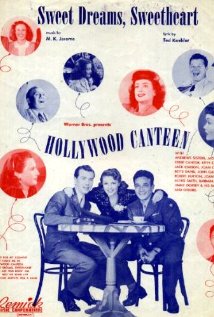
HOLLYWOOD CANTEEN
US, 1944, 124 minutes, Black-and-white.
The Andrews Sisters, Jack Benny, Joe E.Brown, Eddie Cantor, Kitty Carlisle, Jack Carson, Dane Clark, Joan Crawford, Helmut Dantine, Bette Davis, Faye Emerson, Victor Francen, John Garfield, Sydney Greenstreet, Alan Hale, Paul Henreid, Robert Hutton, Andrea King, Joan Leslie, Peter Lorre, Ida Lupino, Irene Manning, Dennis Morgan, Janis Page, Eleanor Parker, William Prince, Roy Rogers/Trigger, S. Z. Sakal, Zachary Scott, Alexis Smith, Craig Stephens, Barbara Stanwyck, Donald Woods, Jane Wyman, Jimmy Dorsey and his orchestra, Carmen Cavallaro and his orchestra, Sons of the Pioneers.
Directed by Delmar Daves.
Hollywood Canteen was a 1944 morale-boosting film, also a fundraiser, for the canteen in Hollywood (very much like the New York Stage Door Canteen). Bette Davis and John Garfield were influential in the establishing of the canteen and speak to camera about their work.
There is a slight story to give some kind of shape to the film which is a showcase for so many of the people walking working at Warner Brothers at this time. Robert Hutton plays Slim, on leave with his buddies before moving out to action. He has dreamt of the possibility of meeting Joan Leslie – and even of a kiss. He goes to the canteen, meets a number of the stars as do his buddies, and the word gets around about his dreams for Joan Leslie. She is asked to do a favour for the canteen and to meet up with Slim, having some time together, walking and talking around Los Angeles, her taking him home to visit her parents. He gets the kiss and the dream fulfilment.
The location is authentic and recreates, though in black and white, the sets around the canteen as well as various Los Angeles locations.
Joan Leslie is acting a character as well as being herself, agreeable in making herself available to meet Slim, and the canteen organising that he receive a prize for being the millionth visitor to the canteen.
It is always interesting to see so many stars, even major stars like Joan Crawford and Barbara Stanwyck, even Roy Rogers and Trigger, along with the regulars at Warner Brothers at this time, singing, dancing, joking. There is even a scene in the kitchen where Paul Henreid and Dane Clark are part of the kitchen staff discussing the situation with Slim.
This film is really recreation film, part of Hollywood history, a reminder of the star power of the 1940s – and appreciating their contribution to morale boosting.
Published in Movie Reviews
Published in
Movie Reviews
Tagged under
Saturday, 18 September 2021 19:58
Wolfpack, The
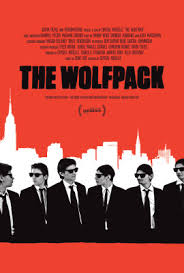
THE WOLFPACK
US, 2015, 90 minutes, Colour.
Directed by Crystal Moselle.
As we watch this film, it is something with something of disbelief. How could the situation be? And how could it be on the Lower East Side of Manhattan? Is it real? Did this really happen? Could it have happened? This is a New York story, but a story with a great difference.
And the opening of the film rather compounds the disbelief. Here we see half a dozen young men, dressed like the characters from Tarantino’s Reservoir Dogs, re-enacting some of the key scenes, doing role-plays of the violence – allotted each of the characters of Mr… And dressed in those black suits. And it continues, with one of the young men transcribing all the dialogue from Pulp Fiction, and re-enacting the car wash scene. And who are these young man – quite obviously brothers, with strong facial resemblances.
And, how could they possibly have allowed the film makers into their apartment to photograph everyone in such detail?
Actually, the answer doesn’t come in the film but rather in the press notes. The film’s director, Crystal Moselle, says she was walking down a New York Street when she saw the six men on the sidewalk, was fascinated by the way that they were dressed and how they walked. She spoke to them, listened to what they had to say and asked could she photograph them – and they agreed.
The father, Oscar Angulo, came from Latin America, married an American, and always planned to move his family to Scandinavia where he thought they would be much safer than in New York City. But, they never hade the money and so they stayed. He was fascinated by Indian Vedic religious traditions and gave his children Indian names. But, he kept them all inside the apartment, six boys and a girl, home-schooling, making them wary about going outside (although they could see so much of the city, the lanes of cars on the road outside their window) and finding that they could live their lives within their apartment. His main concession was allowing them to watch the movies, which they did avidly, discussing their preferences in the film, showing their reenactments – making us realise that they had absorbed a lot of the expletive-dialogue that they heard in the movies.
We contemplate this for quite a while and there is very little seen of the father until almost halfway through, an interview with him, his explaining his philosophy of life, his fear of the violence of the city, his protectiveness. We see a great deal more of the children’s mother, a friendly kind of woman, loving her husband, going along with his plans, but now coming to the realisation that perhaps they were too over-protective and that the young men need to venture out into the world. Which one would think would be easy, given their familiarity from the films, but as they go out, they are quite tentative, travelling on the subway, walking along the sidewalks, going to the first film in an actual cinema. The sequence where they go out into the countryside and breathe the air, experience the sunshine, pick fruit from an actual tree reminds us of how limited their life had been.
At this stage, there are moments of rebellion, criticism of the father – but a certain generalisation about what they had experienced with him, although the film is dispersed with home movies of their childhood and growing up.
So, the filmmakers observe life within the house, some of the venturing outside – but there is very little given by way of explanation (the director not intruding with questions or voice-over) of their growing up, the tensions within the family (they are never shown clashing with one another), emotional development, psychosexual development.
The story seems very bizarre at times and we are somewhat relieved that the young men are venturing outside – but it would be very interesting to do a follow-up, to see how they cope, and hear how they begin to articulate their experience of what happened to them, their growth, and their criticisms of what was, in many ways, an imprisonment.
1. The impact of the film? Awards?
2. A true story, the director seeing the brothers in the street, the way that they were dressed, asking who they were – and being allowed to film their story?
3. The credibility of the story, the family, the father from Latin America, marrying an American, the seven children, the six sons, the place of the daughter, confining them to their apartment, home education, sheltering them from New York City, the reliance on movies?
4. The perspective of the director, making a documentary, something of an expose? Photographing the characters – but not intrusive?
5. The credibility of the situation, showing actual footage from home movies of childhood, the gradual explanations? The father, background from Latin America, interest in Hindu traditions, the Indian names for the children, his desire to take them to Scandinavia for further protection?
6. The introduction to the brothers, the focus on cinema, their watching DVDs, lists of favourite films, the influence of Quentin Tarantino? Re-enacting Reservoir Dogs, the violence in shooting sequences, studying Pulp Fiction, transcribing the screenplay, watching, enthusing, acting (and absorbing the
rough language of the films)?
7. The mother as a character, the interviews with her, her appearance, age, the relationship with her children, marrying her husband, loving him, affection towards him over the years, her changing attitude towards the children at home, phoning her mother for her 88th birthday, no contact for 50 years? Participating in the family activities? The cheerful person? Going out, her joy in looking at the car window, the beauty of the cliff, in the orchards?
8. The six boys, 18 and under, the physical resemblances, the different ages, allowing themselves to be photographed, the insertion of the range of the home movie clips and the images of themselves and their growing up? The explanation of the home-schooling, protection, not going out, watching the cars in the streets and the life of the lower East Side from the window? A kind of imprisonment?
9. The late interview with the father, his life, origins, New York City, Scandinavian hopes, keeping the children apart, his protecting them, the bad impression of New York life, his fears? The mystery of his treatment of his sons, the repression, their comments on his behaviour, rebellion, possibilities for
forgiveness?
10. Growing older, the change, going out, the clothes – and the touch of Reservoir Dogs? Walking the sidewalks, encountering people? Travelling on the subway? The fresh air, the joy of going to the cinema for the first time, the effect of everything? Their hair cuts? The trip outside, in the orchard, the fruit, in the sunshine and the light of day?
11. The connection amongst themselves, their bonds, sharing, the place of their sister, protected and isolated, the effect?
12. The film and their acting and photographing, glimpses of the virtues and vices through the window, Chloe and her being made up, participating in the film? The masks and reality?
13. The film not exactly giving explanations of their emotional development or lack of development, family bonds, psychosexual development? Seeing the brothers only in harmony with each other?
14. The film as something of a glimpse, providing the images and story, and provoking more questions than giving answers?
Published in Movie Reviews
Published in
Movie Reviews
Tagged under
Saturday, 18 September 2021 19:58
Corinna, Corinna

CORINNA, CORINNA
.US, 1994, 118 minutes, Colour.
Whoopi Goldberg, Ray Liotta, Tina Majorino, Don Ameche, Wendy Crewson, Joan Cusack, Larry Miller.
Directed by Jessie Nelson.
Whoopi Goldberg must be a workaholic and/or enjoy making movies. She appears in so many. This is a genial family film that many find a bit too sentimental, but Whoopi is enjoyable as usual. She is a clever comic and she can sustain serious roles. Here she is Corinna, who gets a job looking after a little girl who has lost her mother (Tina Majorino who is cornering the market on this kind of role - When a Man Loves a Woman, Andre, Waterworld). The setting is the 1950s.
Ray Liotta, who usually plays psychotic characters or gangsters (Goodfellas, Unlawful Entry, Something Wild), is rather surprising as the nice but grieving and harrassed father. You will not be surprised at what happens.
1. A family film about family? Grief, how to cope with grief? A film of sentiment, pleasing?
2. The 1950s, life in the United States in the Eisenhower era? The film’s focus on race issues? Segregation, changing attitudes, prejudices, black characters being wary, insensitivity of whites? Romance between black and white? As persons? Young children, not having prejudices, being together and overcoming any prejudice beforehand? The background of Manny’s Jewish parents and his mother’s attitude towards African- Americans?
3. The initial situation, the death, grief, the aftermath of the funeral, Molly under the table? The father’s response? grandfather and grandmother? not talking, being bewildered, her father and his atheism, no angels, no heaven?
4. Manny, his age, the loss, his job, meetings with the board, composing the jingles? Yet depressed? Sid and his friendship, at the office?
5. Manny his mother, the setup, Jenny, social connections, her flirtatious manner, her boys, the visits, Molly not responding well to her?
6. The auditions for the range of nannies, appearances, manner, discipline…? Joan Cusack as Jonesy and her making advances?
7. Whoopi Goldberg as Corrina, the look, style, comedy, seriousness? Her being well-educated, her wanting to write the sleeves of albums, her submissions and their rejections?
8. Molly, her age, remembrance of her mother, with her father, not speaking, reticent? The interview with Corrina, throwing the ball, Corrina’s response, her looking at Molly? Her father seeing this? Corrina employed, going to the drive-through, the attendant getting in the car, the suggestion about touching the nose for consent, Molly pondering, and acting on it, the beginning of the breakthrough?
9. Corrina sharing with Molly, taking her to school, but Molly’s experience of being bullied, Corinna telling her to say that she was the best? Corinna taking Molly to her family, playing with the children, no racial issues? In the choir? Corrina taking her to clean the wealthy mansions, the activity, the sloppy houses, going into the pool? And Molly later able to tell her grandmother about the better cleanser?
10. Manny, becoming happier, Corrina not being skilled as a cook, the meals, the personal interactions with Corrina, his gratitude, the dinner and the invitation to stay, the accidents? The jingle and the rhyme and Corrina’s advice? His success? Taking Corrina and Molly out – and Corrina being taken as the waitress and the racist attitudes? The success, the flowers, Jenny coming, her attitude towards Corrina as the maid? Molly and her phoning her father to interrupt her?
11. Her grandfather and grandmother, the visits, the grandmother and her racial prejudice, the comparison between birds and fish and their incompatibility? The response to her grandfather?
12. At home, Corrina and her sister, her sister’s narrow outlook, some jealousy of her sister’s achievement, the family sequences, criticism, the letter and the rejection?
13. The accidental kiss, the busybody neighbour phoning Manny’s mother? Their being together, their dancing?
14. Manny discovering that Molly missed school, his blaming Molly, attacking her and firing her?
15. Grandfather’s death and the effect on everyone? Jenny interfering and Manny rejecting her? His mother’s grief?
16. Molly calling out for Corinna? Manny coming to apologise? Coming to her house, invited in, Corinna’s sister? A future?
Published in Movie Reviews
Published in
Movie Reviews
Tagged under
Saturday, 18 September 2021 19:58
Forget Paris
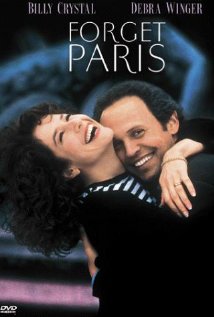
FORGET PARIS
US, 1995, 101 minutes, Colour.
Billy Crystal, Debra Winger, Joe Mantegna, Cynthia Stevenson, Richard Masur, Julie Kavner, William Hickey, Robert Costanzo, John Spencer, Cathy Moriarty.
Directed by Billy Crystal.
Forget Paris is definitely a Billy Crystal film - he directs, writes and stars (and some of the dialogue has Debra Winger praising his talents). But, that reservation having been voiced, the film is an entertaining look at what seems to be a mis-match and how he and she try to come to terms with their marriage. The screenplay uses the device of flashbacks, but with the story told by a succession of voices, Billy Crystal's and then from his friends, all building to the audience wanting the marriage to work.
Billy Crystal is a very talented comedian even if he does hog the limelight. Debra Winger tends to be a serious screen presence but she contrasts well with Crystal. And there are some attractive pictures of Paris. Will the marriage work?
1. A romantic comedy for middle-aged audiences? And for fans of Billy crystal?
2. The American settings, basketball matches, airports, restaurants, homes? The contrast with Paris and its atmosphere? The familiar sights? The songs about Paris? The score?
3. The cast, its range, and their sharing the narrative?
4. The basketball opening, the match, Mickey as referee, last-minute decision, the anger of the players, the crowd? The radio and television commentators?
5. Mickey as a character, sport, the death of his father, his antagonism, the decision to take the body to Paris the burial? All the mistakes? In Paris, his attitude, the staff? His being anti-French? His waiting in the airport?
6. Meeting Ellen, as a character in herself, her job, American, charming, in Paris, helping Mickey? The bureaucratic types? Her going to the funeral and the support?
7. His invitations to go out, the meal, the boyfriend? The interactions, walking around Paris, his sense of humour, the response?
8. As a couple, chatting, the relationship?
9. The story told by the different couples waiting for Mickey and Ellen to turn up? Their own characters, relationships, Liz and her not knowing the couple, and then kept in suspense? The remarks of the couples, the stories leading into the others? Different views?
10. The waiter, the humour, his descriptions of the menu, drinks?
11. The marriage, Ellen, coming to America, her decisions, love? The difficulties of living with Mickey, his travelling over the country for basketball? Mickey and his exasperation with Ellen’s father and his repetitions and absentmindedness? Issues of fertility? The semen, hurrying to the clinic? The range of domestic jokes?
12. Yet growing exasperation, the couple trying to deal with it? The arrival of the meal?
13. Audience anticipation, sympathy with the couple, hoping that everything would work well?
Published in Movie Reviews
Published in
Movie Reviews
Tagged under
Saturday, 18 September 2021 19:58
Secret in Their Eyes/ 2015
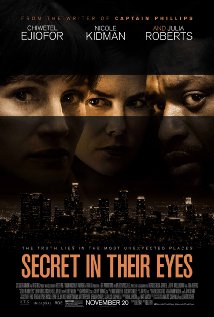
SECRET IN THEIR EYES
US, 2015, 111 minutes, Colour.
Chiwitel Ejiofor, Nicole Kidman, Julia Roberts, Dean Norris, Michael Kelly, Alfred Molina, Joe Cole.
Directed by Billy Ray.
This is a crime story, a police story, a police investigation – with several personal dimensions. The complex plot is very interesting in itself and the interactions of the central characters.
Film buffs will remember that the original film was Argentinian and won the Oscar for Best Foreign Language Film for 2009. The film buffs will be busy making comparisons, tending always to think that a remake is less effective than the original. But most audiences do not have access to Argentinian films and many avoid films with subtitles, so this version will be the main one that they will see.
While the film opens in 2015, much of the action takes place 13 years earlier, in the aftermath of 9/11.
Chiwitel Ejiofor plays Ray, a former FBI agent who has been searching for his suspect for the murder in 2002. When he thinks he has identified a man, after searching for all these years, and now in private investigation practice, he returns to Los Angeles to pursue the suspect. On his return, after being out of contact for these 13 years, he encounters once more the now DA, Claire, played by Nicole Kidman, who had joined the force when he had back then. Much of the action, and tension, of the film is the interplay between the two, the gradual revelation of the attraction in the past, the relationship, their working together, and the passion of his return, for the case and for her.
The other central character is a woman who works for the police force, Jess (Julia Roberts) whose daughter had been murdered at the time. She grieves for her daughter, but now wants to leave the investigation alone. At the time, distraught, she tells her colleagues that she does not believe in capital punishment, that it is too quick for such monstrous crimes and that what is important is that a killer lives day by day imprisoned to pay for the crime.
On the one hand, a lot of the film shows the investigation, initially hampered by the police chief, Alfred Molina, who is preoccupied with threats to Los Angeles, terrorist threats after 9/11, with contacts inside a local mosque. He sees these investigations as a priority and does not put push forward with the murder investigation. There are several leads, the taking of a suspect – during a ball game in the Super Bowl, tour-de-force sequence as the camera is in the sky outside the stadium, gradually goes over the rim, descends, sees action within the Bowl, and then ascends out and away.
For those who have not seen the original film, the ending will come as a surprise, involving the three characters in a way not anticipated. This involves the relationship between Ray and Claire, Claire’s role as the DA, Jess and the final resolution of what happened to the suspect. And the film ends, not with a pat answer but in mid-action, leaving the audience to ponder the strengths and weaknesses of each character and asking themselves what they would do in similar circumstances.
The film was adapted in directed by Billy Ray, writer and director of two very interesting films, Shattered Glass about publishing and journalists’ sources and Breach, the story of the rogue agent who betrayed US secrets to the Russians.
1. Crime story? Police story? Investigation? Personal dimensions?
2. The original, Oscar-winning? This remake and adaptation, making it an American story from an Argentinian story?
3. The title, with reference to each of the central characters, with reference to the killer?
4. The importance of the time shifts, 2015, Ray returning, the investigation, the reunion? Memories of 2002, the crime, the aftermath of 9/11, California, the police and concerned about terrorism in’s LA? The personal meetings again? The audience gradually understanding the previous relationships?
5. Ray, poring over the photos, drawing a conclusion, after 13 years? Going to LA, private investigation? His motivations, meeting Claire, her role as DA, her husband and their life? The discussions, tentative? The meeting with Jess, continuing her work, the past sadness? Meeting Bump again and remembering his collaboration in the past? Meeting Seifert, the past clashes?
6. The situation in 2002? Ray and Claire, new, the interviews, the different jobs, the attraction? Claire with a fiance? The effect on Ray, his work, collaboration? With Seifert, with Bump?
7. Jess, Julia Roberts, cold, seeing her at work, the news of the murder, the breakdown, holding her daughter? Having to handle the situation? The photo of the staff outing, and the presence of the killer, evidence? The scenes of Jess and her memories of Caroline, the discussions? The statements on guilt, imprisonment, capital punishment, disapproving of a quick death, wanting someone to suffer day by day – and the later repercussions of her opinions?
8. The suspect, his work at the mosque, Morales and having him as a link, issues of security after 9/11, police priorities? The use of the killer? His background, age, character, his sketchbook, monsters…? The taking of the book? Morales and his refusal to pursue the case? The stadium sequence, the camera moving over, down into the stadium, the chase, moving out again? Ray and the interrogation, the attitude of Claire? Good cop, bad cop? Claire, quietly spoken, her techniques, explaining the situation, releasing him and the consequences? His breaking down? His lascivious look at her? His taunting them, going free? Morales, the burning of the car, to destroy the evidence? The dropping of the case?
9. Jess, staying, her career? Claire, her achievement, her personality, the scenes of the past, the attraction to Ray? Her husband, 13 years?
10. Ray, older, his return, Seifert and slinging off, the definition of an idiot? Yet the pathos of his being on the job and dying?
11. The incidental street hoarding sign with Morales campaigning for renewal of the votes for Governor?
12. Ray, the effect on his life, the investigation, his motives for tracking down the killer, recognising the photo, bringing it to LA, the comparisons, his certainty, going to the stables, finding the young man, the pursuit, Ray and his ribs being shattered? Lewis at the stable and the promise of information?
13. Claire, the tensions, with her husband – and his saying that Ray had been in the house for 12 years?
14. Jess, her insistence on not pursuing the case?
15. The revelation that the young man was the wrong suspect?
16. Jess, the explanation to Ray and Claire, Claire wary because of her legal status?
17. The flashbacks to what Jess said she did in terms of shooting the suspect? Ray and his suspicions, going to the house, finding the hut, Jess and her imprisoning the killer, bringing him food, his not being able to talk, his plea to Ray? Ray and his going into the yard, digging the grave? Hearing Jess shoot the
killer?
18. The film ending at that moment – leaving the audience to wonder about Ray and his career, with Claire, Jess and her situation and the killer, Claire and her legal role and her marriage?
Published in Movie Reviews
Published in
Movie Reviews
Tagged under